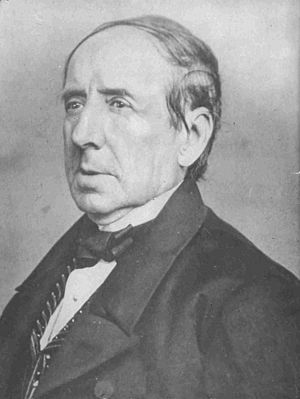Agustín Durán facts for kids
Quick facts for kids
Agustín Durán
|
|
|---|---|
 |
|
| Born | Agustín Francisco Gato Durán 14 October 1789 Madrid, Spain |
| Died | 1 December 1862 (aged 73) Madrid, Spain |
| Occupation | Folklorist Scholar |
| Language | Spanish |
| Genre | Romantic ballads |
| Notable works | Discurso sobre el influjo que ha tenido la critica moderna en la decadencia del teatro antiguo; Romancero general |
| Relatives | Cipriana Álvarez Durán, Demofilo |
| Seat d of the Real Academia Española | |
| In office 25 February 1847 – 1 December 1862 |
|
| Preceded by | Seat established |
| Succeeded by | Enrique Ramírez de Saavedra |
Agustín Durán (born October 14, 1789 – died December 1, 1862) was a Spanish scholar. He was born in Madrid, Spain. His father worked as a doctor for the royal court.
Early Life and Education
Agustín Durán went to a special school called a seminary in Vergara. There, he learned a lot about traditional Spanish stories and poems, known as romances.
In 1817, he started studying philosophy and law at the university of Seville. He later became a lawyer in Valladolid.
Career and Literary Work
From 1821 to 1823, Durán worked in the education department in Madrid. However, he lost his job because of his political ideas.
In 1834, Durán became the secretary for the group that checked books and newspapers before they were published. This process is called censorship. Soon after, he got a job at the national library in Madrid.
He lost his job again during a big change in the government in 1840. But he was hired back in 1843. In 1854, Durán became the main librarian. The next year, he decided to retire to focus on his writing.
In 1828, after he first lost his job, he wrote a book without putting his name on it. It was called Discurso sobre el influjo que ha tenido la critica moderna en la decadencia del teatro antiguo. This book had a big impact on young playwrights at the time.
Durán then tried to get people interested in old Spanish songs (ballads) and plays from the 1600s that many had forgotten. He published a large collection of these old songs called Romancero general in several books between 1828 and 1832. He also reprinted old Spanish comedies in a book called Talía española in 1834.
His Romancero general is still the most complete collection of these old songs.
Later Life
Agustín Durán passed away in Madrid.
See Also
 In Spanish: Agustín Durán para niños
In Spanish: Agustín Durán para niños
 | Mary Eliza Mahoney |
 | Susie King Taylor |
 | Ida Gray |
 | Eliza Ann Grier |

